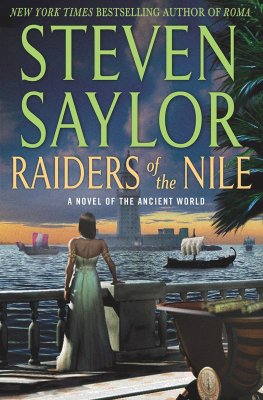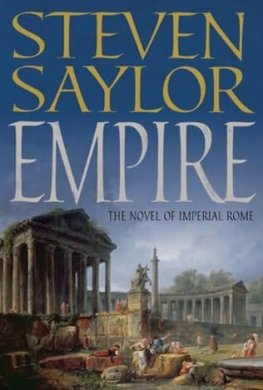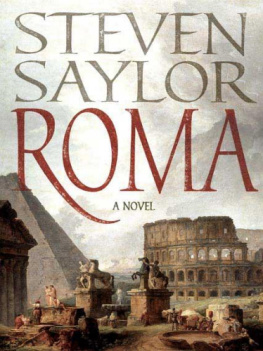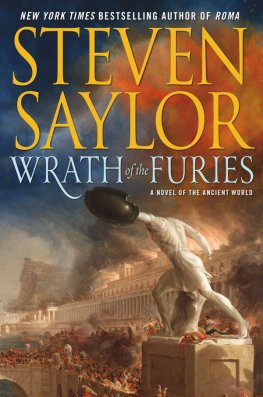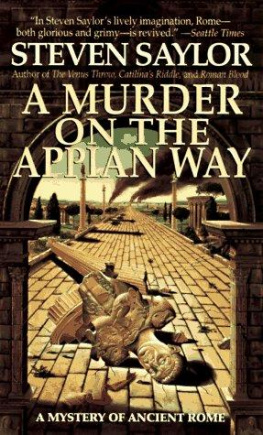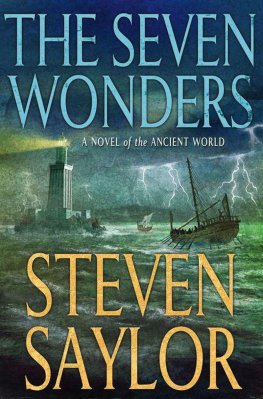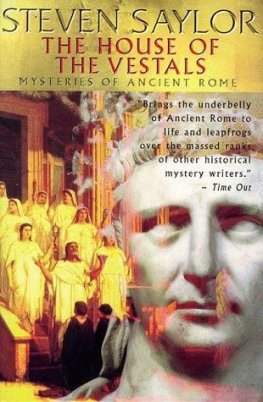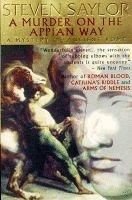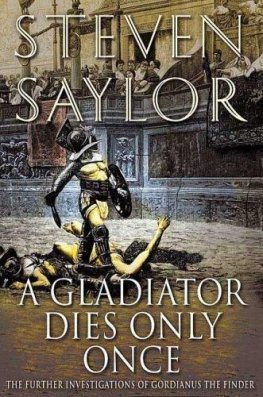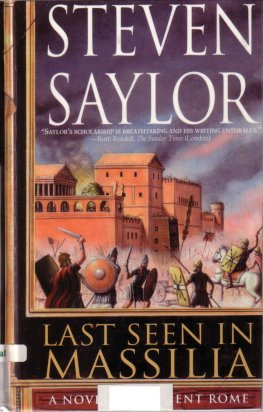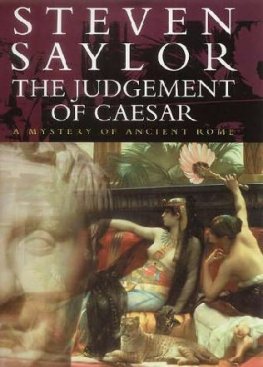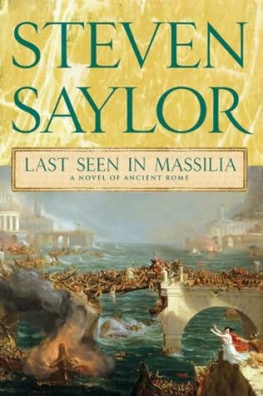Steven Saylor - Raiders of the Nile
Here you can read online Steven Saylor - Raiders of the Nile full text of the book (entire story) in english for free. Download pdf and epub, get meaning, cover and reviews about this ebook. genre: Adventure. Description of the work, (preface) as well as reviews are available. Best literature library LitArk.com created for fans of good reading and offers a wide selection of genres:
Romance novel
Science fiction
Adventure
Detective
Science
History
Home and family
Prose
Art
Politics
Computer
Non-fiction
Religion
Business
Children
Humor
Choose a favorite category and find really read worthwhile books. Enjoy immersion in the world of imagination, feel the emotions of the characters or learn something new for yourself, make an fascinating discovery.
- Book:Raiders of the Nile
- Author:
- Genre:
- Rating:4 / 5
- Favourites:Add to favourites
- Your mark:
- 80
- 1
- 2
- 3
- 4
- 5
Raiders of the Nile: summary, description and annotation
We offer to read an annotation, description, summary or preface (depends on what the author of the book "Raiders of the Nile" wrote himself). If you haven't found the necessary information about the book — write in the comments, we will try to find it.
Raiders of the Nile — read online for free the complete book (whole text) full work
Below is the text of the book, divided by pages. System saving the place of the last page read, allows you to conveniently read the book "Raiders of the Nile" online for free, without having to search again every time where you left off. Put a bookmark, and you can go to the page where you finished reading at any time.
Font size:
Interval:
Bookmark:
Steven Saylor
Raiders of the Nile
It irks me that Eurypyle, so glamorous,
For boorish Artemon has cravings amorous.
He used to go out shabby and threadbare
With wooden earrings poking from his hair.
Wrapped in a smelly oxhide cloak
Repurposed from a shield, he was a joke,
A good-for-nothing crook and a bore,
Seen now with cook, now with whore,
Making a criminal living.
Often I saw him in the stocks, giving
A yelp as he was slapped about
And had his hair and beard plucked out.
But now the son of Kyke appears
In a chariot, with gold rings in his ears,
Carrying an ivory sunshade-
Worthy of a pretty maid?
ANACREON, C. 500 B.C. P OETAE M ELICI G RAECI 43I
Like any young Roman who found himself living in the most exciting city on earth-Alexandria, capital of Egypt-I had a long list of things I wanted to do, but taking part in a raid to steal the golden sarcophagus of Alexander the Great had never been among them.
And yet, there I found myself, on a morning in the month we Romans call Maius, doing just that.
The tomb of the citys founder is located in a massive, ornate building in the heart of the city. A towering frieze along one side depicts the exploits of the world conqueror. The moment of inspiration that gave birth to the city itself, some 240 years ago, is vividly depicted on the frieze: Alexander stands atop a sand dune, staring at the shore and the sea beyond while his architects, surveyors, and engineers gaze up at him in wonder, clutching their various instruments.
So realistically sculpted and painted was this massive frieze that I almost expected the giant image of the conqueror to suddenly turn his head and peer down at us as we scurried below him, heading toward the buildings entrance. I would not have been surprised to see him raise an eyebrow and inquire in a booming, godlike voice, Where in Hades do you fellows think youre going? Why are some of you brandishing swords? And what is that the rest of you carry-a battering ram?
But Alexander remained immobile and mute as my companions and I rushed past him and surged into the colonnaded entranceway.
On this day the tomb was closed to visitors. An iron gate barred entry to the vestibule. I was among those who carried the battering ram. We pivoted into formation, perpendicular to the gate. As Artemon, our leader, counted to three, we heaved the ram forward, then back, then forward again with all our might. The gate shuddered and buckled at the impact.
Again! shouted Artemon. On my count! One-two-three!
Each time the ram butted against it, the gate moaned and shrieked, as if it were a living thing. On our fourth heave, the gate flew open. Those of us carrying the battering ram retreated back into the street and tossed it aside while the vanguard of our party, led by Artemon, rushed through the sundered gate. I drew my sword and followed them into the vestibule. Dazzling mosaics celebrating the life of Alexander decorated every surface from the floor to the domed ceiling high above, where an opening admitted sunlight to shimmer across the millions of pieces of colored glass and stone.
Ahead of me, I saw that only a handful of armed men offered resistance. These guardians of the tomb looked surprised, frightened, and ready to run-and who could blame them? We greatly outnumbered them. They also looked rather old to be bearing arms, with weathered, wrinkled faces and gray eyebrows.
Why were there so few guards, and why were they of such a low grade? Artemon had told us that the city was in chaos, wracked by daily riots. All the most able-bodied soldiers had been summoned by King Ptolemy to protect the royal palace, leaving only this feeble handful to defend the Tomb of Alexander. Perhaps the king thought that even the most violent mob would never dare to violate such a sacred place, especially in broad daylight. But Artemon had out-foxed him. Our greatest advantage will be the element of surprise, he had told us, and it appeared that he was correct.
I heard a clash of swords, followed by screams. I had deliberately volunteered to man the battering ram, so as to avoid being on the front line of whatever battle might take place. I wanted no blood on my hands, if I could possibly avoid it. But was I really less guilty than my comrades ahead of me, who were gleefully hacking away with their swords?
You may wonder why I was taking part in such a criminal act. I had been compelled to join these bandits against my will. Still, might I not have slipped away at some point and escaped? Why did I stay with them? Why did I continue to follow Artemons orders? Did I do so out of fear, or misplaced loyalty, or simple greed for the share of gold we had all been promised?
No. I did what I did for her-for the sake of that crazy slave girl who had somehow got herself kidnapped by these bandits.
What sort of Roman would stoop to such criminal behavior for the sake of a girl, and a mere slave at that? The blinding Egyptian sun must have driven me mad, that I should find myself in such a spot!
As I rushed through the vestibule, toward the wide corridor that led to the sarcophagus, I realized I was whispering her name: Bethesda! Was she still well, and unharmed? Would I ever see her again?
I slipped on a pool of blood. As I spun my arms to balance myself, I looked down and saw the pale face of a fallen guard. His lifeless eyes were wide open and his mouth was set in a grimace. The poor old fellow might have been someones grandfather!
One of my companions helped to steady me. Careless fool! I thought. You might have broken your neck! You might have fallen on your own sword! What would have become of Bethesda then?
I heard the sounds of another battle ahead of us, but its duration was brief. By the time I stepped into the chamber, only one guard remained standing, and even as I watched, Artemon stabbed him in the belly. The poor fellow crumpled lifeless to the hard granite floor. His sword fell beside him with a clatter, and then a hush fell over the crowded room.
Lamps set in niches in the walls provided the only illumination. Though it was bright daylight outside, here all was dim light and shadow. Before us, raised upon a low dais, was a massive sarcophagus. In form and style it was partly Egyptian, like the angular mummy cases of the ancient pharaohs, and partly Greek, with carvings along the sides that depicted the exploits of Alexander-the taming of the steed Bucephalus, the triumphal entry into the Gates of Babylon, the terrifying battle with the elephant cavalry of the Indus. The gleaming sarcophagus, made of solid gold, was encrusted with precious stones, including the dazzling green gem called the emerald mined from the mountains of southernmost Egypt. The sarcophagus glittered in the flickering light of the lamps, an object of breathtaking splendor and of value beyond calculation.
Well, what do you make of that?
I shivered, as if startled from a dream. Artemon stood beside me. His bright eyes sparkled and his handsome features seemed to glow in the ruddy light.
Its magnificent, I whispered. More magnificent than I ever imagined.
He grinned, flashing perfect white teeth, then raised his voice. Did you hear that, men? Even our Roman comrade is impressed! And Pecunius-that was the name by which he knew me-is not easily impressed, for has he not seen the Seven Wonders of the World, as he never tires of telling us? What do you say, Pecunius-is this sarcophagus the equal of those Wonders?
Can it really be made of solid gold? I whispered. The weight must be enormous!
Yet we have the means to move it.
Even as Artemon spoke, some of the men brought forth winches, pulleys, lengths of rope, and wooden shims. Another group appeared from the vestibule wheeling a sturdy wagon down the wide corridor. The wagon was loaded with a lidded wooden crate made especially for our cargo. Artemon had thought of everything. Suddenly he looked to me like the young Alexander as depicted on the frieze of the building, a visionary surrounded by adoring architects and engineers. Artemon knew what he wanted and had a plan to achieve it. He inspired fear in his enemies and confidence in his followers. He knew how to bend others to his will. Certainly he had succeeded at making me do as he wanted, against all my better judgment.
Font size:
Interval:
Bookmark:
Similar books «Raiders of the Nile»
Look at similar books to Raiders of the Nile. We have selected literature similar in name and meaning in the hope of providing readers with more options to find new, interesting, not yet read works.
Discussion, reviews of the book Raiders of the Nile and just readers' own opinions. Leave your comments, write what you think about the work, its meaning or the main characters. Specify what exactly you liked and what you didn't like, and why you think so.

